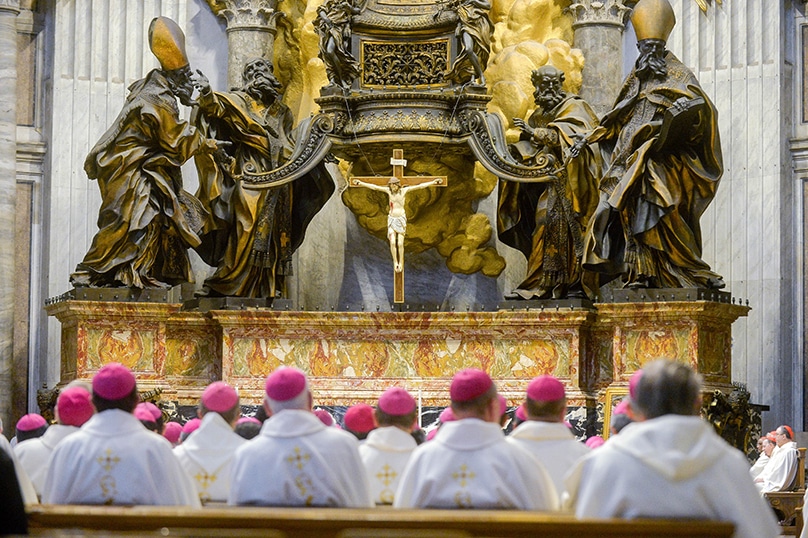
As the first assembly of the Synod on Synodality draws to a close, the polarisation over this ecclesial project remains—at least if the online commentary is anything to go by.
Some view the synod process as a Trojan Horse for novel agendas and compromise of the church’s teaching. Others see it as a long-awaited bridge to a new form of ecclesial life and a necessary stimulus for the church’s engagement with the world.
The elasticity of the concept of synodality has contributed to the divergent positions. In some contexts, synodality appears as a wide-ranging sensibility, a “spirit” or habit that is to infuse Catholic discipleship in relationship to others. On other occasions its meaning is squarely fixed on issues of power, church structure and governance.
What is clear is that if the church is called to be “in Christ, a sacrament of unity—a sign and instrument of communion with God and of the unity of the whole human race” (Lumen Gentium 1), then synodality cannot be viewed as an end in itself or an exercise in self-absorption.
The church’s “journeying together” is not a directionless escapade but a pilgrimage in faith towards a growing union in Christ. It is from this personal encounter, made possible primarily through the Word and sacramental life, that the community of Christians, the church, is formed and finds its missionary energy.
In sharing the writings of St Irenaeus and St Basil with synod delegates at the first assembly, Pope Francis is also keen to underscore this journeying of the church in closeness to Christ and our neighbour, animated and given “soul” by the Holy Spirit.
It is the Spirit who enables all people to be one and this unity to be a multitude. It is the Spirit who gathers what has been scattered, overcomes division, nourishes the bonds of faith, and enables the baptised to be faithful to Jesus’ teaching and witness in the present, including his mission to “all the nations.”
In reflecting on the spiritual and social aspects of synodality, an image from the Instructions of St Dorotheus of Gaza comes to mind—the world as a circle in which God is the centre, with the radii the different ways in which human beings live.
The saint of Gaza, that land in which peace and reconciliation are so desperately in need today, wrote that, “When those who wish to come closer to God walk toward the centre of the circle, they come closer to one another at the same time as to God.
“The closer they come to God, the closer they come to one another. And the closer they come to one another, the closer they come to God”.
It is a vision of communion that captures the spiritual and relational dimensions that synodality implies. It is the participation of all the baptised in this lifelong turning or conversion to Christ—a journey that demands listening and attentiveness among his disciples, liturgical worship, prayerful discernment and docility to the Spirit, and social witness to the truth and mercy of the Gospel—that is the basis of genuine communion.
It is this personal attachment and clinging to Christ that differentiates the pilgrimage of a communion from the meanderings of a crowd.
It is also this pilgrimage to Christ that supplies the motive for mission and rescues the church from becoming “self-referential” as Pope Francis puts it. Those who encounter Christ cannot help draw others in the “circle” of the world to God “at the centre.” As expressed by Pope John Paul II, the renewal of faith will always be the best way to lead others to Christ and further the transformation of the world.
In the end, this triad of participation, communion and mission that Pope Francis places at the heart of synodality depends largely on the evangelisation and formation of everyday Catholics as mature disciples. We do not embark on journeys for which there is no desire, or sustain the long obedience of discipleship without nourishment.
If synodality is to be concretely realised within the life of the church and bear the fruit of missionary disciples for the sake of the world, it calls upon every baptised Catholic to have a personal relationship with Jesus in the midst of the church, cultivate a daily prayer life, develop openness to the gifts of the Holy Spirit, nourish a knowledge and love of the Scriptures, receive from and participate in authentic Christian community and an active sacramental life, and seek to live as a missionary or apostle in everyday affairs.
In other words, “synodality” depends on making and forming disciples, without which it risks being what Pope Francis describes as a superficial buzzword used at meetings.
Without openness to this ongoing conversion and maturing faith at the heart of authentic and lasting ecclesial reform, Pope Francis concludes even “the Synod could be reduced to an extraordinary event, but only externally; that would be like admiring the magnificent facade of a church without ever actually stepping inside.”
